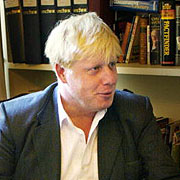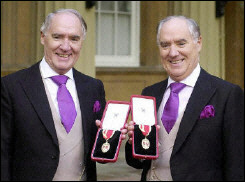
The Spectator editor, Boris Johnson, displaying his notorious indiscipline
 The Spectator editor, Boris Johnson, displaying his notorious indiscipline |
 The Spectator owners, the Barclay twins, displaying medallions of their knighthood |
The Spectator fails to acknowledge the indispensability of editorial submission to truth
The Spectator, of which I understand you to be the owners, disclosing on its "about us" web page
www.spectator.co.uk/about_us.php
that editor Boris Johnson's "sole editorial constraints" are "originality of thought and elegance of expression" omits what some hold should be the paramount editorial constraint of "truth." If truth is as neglected in editorial practice as it is in editorial statement of constraints, the inevitable result will be the publication of disinformation and defamation, as appears to have happened in John Laughland's 06-Nov-2004 The Spectator article Western Aggression www.antiwar.com/spectator2/spec506.html.
An explanation of why Spectator editor Boris Johnson should have doubted Laughland's article, and why he should have refused it publication, requires an understanding of two different Helsinki organizations currently coexisting in Britain.
Two British Helsinki organizations arrive at opposite conclusions
It appears that Britain hosts two Helsinki organizations whose evaluations of the 31-Oct-2004 presidential election in Ukraine are diametrically opposed.
The British Helsinki Human Rights Group (BHHRG) says that the Ukrainian election was fair: "The Group's observers concluded that the election held on 31st October in Ukraine was conducted to a very high standard, making a refreshing change from previous Ukrainian polls which they had witnessed"
www.bhhrg.org/CountryReport.asp?CountryID=22&ReportID;=226 .
The other organization is the British Helsinki Subcommittee of the Parliamentarian Human Rights Group. In order to clearly distinguish the two groups, the former will be referred to as the Bogus-BHHRG (for reasons that will be explained below), and the latter as the Parliamentary-BHHRG. The Parliamentary-BHHRG does not have its own web site, but rather is represented on the International Helsinki Federation (IHF) web site, of which it is an offshoot, such that the positions taken by the Parliamentary-BHHRG and the IHF may be assumed to be identical. The IHF has published two pre-election reports from which it is evident that the Parliamentary-BHHRG considered the Ukrainian election to have become compromised well before polling day:
HONORARY CHAIRMAN: Yuri Orlov |
CHAIR: Ann Clwyd |
IHF EXECUTIVE DIRECTOR: Aaron Rhodes |
CHAIR, UKRAINIAN HELSINKI HUMAN RIGHTS UNION: Yevgeniy Zakharov |
|
GREEK HELSINKI MONITOR
(Greek National Committee of the International Helsinki Federation) & MINORITY RIGHTS GROUP � GREECE (Greek Affiliate of Minority Rights Group International) P.O. Box 51393, GR-14510 Kifisia, Greece Tel. 30-1-620.01.20; Fax: 30-1-807.57.67; E-mail: [email protected] PRESS RELEASE 3/8/1997 TOPIC: �HELSINKI� DOESN'T GUARANTEE FAITHFULNESS TO HUMAN RIGHTS By Panayote Elias Dimitras and Aaron Rhodes
Since the signing of the Helsinki Final Act over 20 years ago, the name �Helsinki� has become emblematic of specific political principles and values. The so-called �Human Dimension� commitments undertaken by the members of the Organization for Security and Cooperation in Europe (OSCE) are �politically-binding� pledges to uphold the freedom of thought, conscience, religion or belief; the freedom of expression and the principle that independent media should be permitted; the freedom of movement; and the obligation to hold free and fair elections. The �Helsinki� commitments also obligate the participating countries to prevent torture and cruel and degrading treatment; to uphold international humanitarian law; to work toward the abolishment of capital punishment; to uphold the �rule of law�; to promote tolerance and protect the rights of national minorities. Greek Helsinki Monitor www.greekhelsinki.gr/english/pressrelease/3-8-97.html |
Google credits four other names with two "results" each on the Bogus-BHHRG web site: Alastair Macleod, Norman Stone, Mary Walsh, and David Westover. These appear to each have taken part once as observers in a Bogus-BHHRG travelling delegation.
From what can be gathered about the Bogus-BHHRG, it would appear that it in fact consists of primarily two individuals � John Laughland and Mark Almond � and with Christine Stone making briefer appearances mainly in the role of travelling delegate. Relying on the number of Google results, Mark Almond appears to be the dominant member of the group. Relying on John Laughland being identified as a "trustee" gives him the appearance of dominance.
What is the motivation behind the Bogus-BHHRG?
If the IHF conclusion that the Bogus-BHHRG plays the "role of PR flack for a new breed of authoritarian rulers in Europe" is credited, then we may hypothesize that the "new breed of authoritarian rulers" � "dictators" for short � may well be willing to trade what they are long of (dollars) for what they short of (favorable publicity). In short, a viable hypothesis is that the Bogus-BHHRG amounts to little more than a couple of guys working as lobbyists for dictators.
What integrity is required of a journalist?
Although lobbyist for dictators may be an honorable profession, it creates a conflict of interest when combined with the role of journalist. Thus, John Laughland writes on the pages of his Bogus-BHHRG that the Ukrainian election was fair with the exception of some Yushchenko impropriety, and if he does so without compensation, then he gives away gratis what he could easily sell, as Vladimir Putin, Leonid Kuchma, and Viktor Yanukovych are willing to pay good money for exactly this sort of whitewash of their manipulation and chicanery. John Laughland's conflict of interest arises when he doffs his lobbyist cap, and dons his journalist cap, and writes from the same point of view on the pages of The Spectator, essentially offering there a synopsis of the Putin-Kuchma-Yanukovych platform: Western Ukraine, where Yushchenko support is strongest, is anti-Semitic; Yushchenko supporters are "druggy skinheads"; Yushchenko could not have been poisoned; the Kuchma administration committed no electoral fraud, but the Yushchenko opposition did; Yushchenko cannot be a free marketeer because Western Ukraine is "an economic wasteland"; Yanukovych can be credited with economic growth and with a clean and prosperous Kyiv; Yushchenko is a tool of Nato which wants to sell Ukraine expensive weaponry; Ukraine is split between people who prefer to speak Ukrainian and people who prefer to speak Russian.
But if John Laughland wishes to place his Bogus-BHHRG at the service of dictators Putin-Kuchma-Yanukovych, then he cannot expect to be credited when he echoes the identical message in the guise of journalist on the pages of The Spectator.
At the same time, it seem inconceivable that editor Boris Johnson is unaware either of the fraudulent nature of the Bogus-BHHRG, or that it serves as a front for John Laughland's lobbying for dictators, or of the implausibility of much that John Laughland wrote concerning Ukraine in his Spectator article. Thus, Boris Johnson appears to be implicated in what seems to be a pocket of corruption at The Spectator.
It might be in the interests of bolstering the integrity of The Spectator, and defending the interests of truth, if you were to extirpate this pocket of corruption.
Lubomyr Prytulak